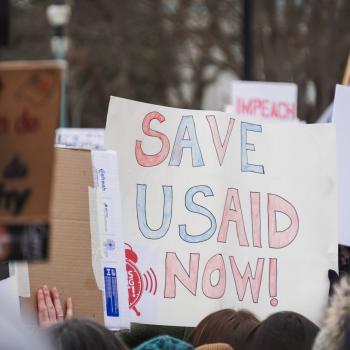“But let justice flow like water, and righteousness, like an unfailing stream.”
– Amos 5:4
The conversation in the evangelical Church right now concerning social justice, intersectionality and critical race theory is inescapable. It seems appropriate, therefore, to consider some practical questions on how one might engage in social justice issues given today’s cultural context.
These questions are primarily addressed to Christians, but not necessarily everyone who calls themselves Christian or who goes to church. I am mainly addressing those Christians (Evangelical, Roman Catholic, or Orthodox) who consider the truth claims of the Bible to be universal and fixed, along with the propositional statements of the ecumenical creeds and councils. In other words, this post may resonant little with people who identify as post-modern or progressive Christians, or who are theological anti-realists of some kind. In that sense, I am presupposing a certain kind of Christian who holds to certain assumptions. I am speaking to my “tribe” if that matters.
With this in mind, these questions are not meant as rigid criteria for making a decision on how, when, or with whom one should engage in Social Justice (SJ) activities. These are pastoral suggestions that each individual can prayerfully reflect on to see if it applies or not. Protest in the name of righteous action against social injustice is compatible with a biblically informed witness to truth. However, social action that is carried out without regard for biblical truth or without a heart oriented toward Christ, can play into the hands of the Devil, who presents distorted answers to real human problems (in fact, that is almost all he does).
Without further ado, here are 10 questions that might be helpful to Christians before engaging in an event or movement that can be reasonably identified as a Social Justice initiative.
Question 1: Can you protest issue “x” without making accusations against people, businesses, groups or institutions, unless those accusations are grounded in substantial evidence that you yourself are aware of and have carefully evaluated? This first point requires a bit of clarification.
We all must wrestle with the reality of propaganda in contemporary culture and with our penchant to accuse or blame (Genesis 3:12-13). With the rise of the internet, mass and social media and the ubiquity of television shows, movie franchises and advertisement, it becomes an increasingly severe reality for any Christian to confront: we are being propagandized to all the time. In his harrowing account of propaganda, French sociologist, Jaques Ellul, points out a central feature of this social propaganda:
Sociological propaganda expresses itself in many different ways–in advertising, in the movies (commercial and non-political films), in technology in general, in education, in the Reader’s Digest; and in social services, case work, and settlement houses….
Such activities are propaganda to the extent that the combination of advertising, public relations, social welfare, and so on produces a certain general conception of society, a particular way of life. We have not grouped these activities together arbitrarily–they express the same basic notions and interact to make man adopt this particular way of life. From then on, the individual in the clutches of such sociological propaganda believes that those who live this way are on the side of the angels, and those who don’t are bad; those who have this conception of society are right, and those who have another conception are in error.
Jaques Ellul, Propaganda: The Formation of Men’s Attitudes, 64-65 [emphasis mine]
Ellul wrote this in 1965, decades before the advent of the internet and social media platforms. His contemporary, the German critical theorist, Theodore Adorno, made a similar claim the previous year:
When his sociology students asked him to specify his conception of social integration after a lecture in 1964, Adorno responded: ‘The integration of society has grown in the sense of increasing socialisation; the social web has been spun ever more tightly, there are ever fewer areas . . . that are not . . . more or less seized by society.’”
Excerpt From: Matthias Benzer. “The Sociology of Theodor Adorno.” Apple Books.
The diligence required in 2021 to be certain we are protesting based on a convicting truth and a genuine longing for justice, and not just to be part of a cultural trend, is that much more demanding. The Christian life offers far more freedom than most are willing to admit, or even aware of, and to accuse others of being vicious or wicked or cruel or stupid on no biblical grounds whatsoever is probably due to a subconscious acquiescence to the power of suggestion than to truth.
Question 2: Can you protest issue “x” knowing that you, in your own personal life, are not currently engaging in a similar or comparable type of sin or injustice? In other words, is your own house in order before you go out and tell other people they need to get their act together?
In an enigmatic, yet apparently apodictic teaching (see Graham Ward, Christ and Culture, 31), Jesus tells his disciples “do not judge, so that you will not be judged. For with the judgment you use, you will be judged, and with the measure you use, it will be measured to you” (Matt 7:1-2, cf. Mk 4:24 and Lk 6:38). It is unclear whether Jesus is speaking of moral or spiritual judgment here (Ward, 31), however, that this saying has eschatological overtones should be carefully noted.
Question 3: If you protest “x,” is the cause you are advocating for compatible with God’s moral law as laid out in Scripture? In other words, can you make distinctions between social justice issues that are also issues of biblical justice, e.g. sex trafficking or abortion, versus social justice issues that are actually seeking liberation from what the Bible says is just, e.g., marriage? For more on the difference, see here.
Question 4: Are you currently engaged in any kind of sexual immorality in your own life, and, if so, can you get that under control before you go out and support some social cause or movement? This question, I think, is particularly for the Christian men (but not exclusively), and also needs additional points of clarification.
Point 1: Getting involved in emotionally charged movements and events like ones that arise within the SJ context are often used as a means by young men to meet girls. Not that meeting girls is wrong for young, Christian men. In fact, they may be morally obligated to do so in many cases (1 Cor 7:1-7). However, if one has an underlying motivation to meet and maybe have sex with women under the pretense of being a social justice warrior, then I would warn young men to rethink their motivations for engaging in social justice. I cannot quantify this claim, nor do I have a study to link to. But, I can admit from personal experience that I used to do this all the time when I was younger (prior to my conversion, and maturation). Back then, I often engaged in “noble” SJ activities, primarily in the hopes of attracting women to my person. The two are not necessarily incompatible, but motivation does matter in the Christian life.
Point 2: More than anything, the most serious issue facing the church right now is sexual immorality (not racism, not economic inequality and not immigration laws). Sexual impurity is devastating both evangelical churches and the Catholic Church. Thus, if there is idol that the Church needs to focus on tearing down, it is this one. Further, a good number of SJ movements and their events are directly and justifiably related to the sexual mistreatment of women, e.g. #metoo. Therefore, Christian men should be exemplars of personal, sexual discipline when they are out and about advocating for righteous SJ causes. Just like the prophets and apostles before them.
Point 3: Knowing some of the roots of Critical Theory, especially one of its main proponents, Herbert Marcuse, there is reason to think that many SJ movements are inherently movements that view the Bible and Christianity itself as something from which one must be liberated. This especially in the area of sexuality. Thus, one might go to protest in some SJ event that at face value appears to be concerned with racial or economic injustice, only later to find oneself involved in a protest that also wants a society liberated from the norms of historical, Christian teaching on human sexuality.
One last caveat on this point. Many SJ events do seem to act as an extension of the Sexual Revolution of the 1960’s. It is claimed by various SJ organizations that liberation from external oppressors is the thrust of today’s SJ activities. However, entailed in that claim is often the liberation from the guilt associated with sexual behaviors, a central tenet of the Sexual Revolution. The Sexual Revolution of the 1960’s has not ended, nor likely ever will.
Question 5: Does the movement or cause you are joining support or promote sexual behavior that is against the clear teachings of the Scriptures? See points 3 & 4.
Question 6: How is your family life? If you are married, are your spouse and children on board with your desire to protest? If not, why? I’m not saying a spouse is always right, but it’s at least a conversation that needs to happen. Remember to keep your first vocation first, which is never easy, but often the main avenue of attack for the enemy.
Question 7: What are the metaphysical and epistemological commitments of those groups you are protesting alongside? What are those groups’ view of moral values and duties? Certainly one can protest issues alongside co-religionists or even atheists (as many Christians who are against Critical Race Theory, for example, are doing today). Nevertheless, it may be prudent to understand a groups’ fundamental starting points, i.e. their first things, before you get involved with them.
Some might protest here saying that philosophy doesn’t matter, that philosophy is dead or that it has never produced any practical results. Of course this is the furthest thing from the truth. Regarding the relevance of philosophy to practical consequences, I can only second Peter van Inwagen’s sentiments:
The thesis that there are no established results in philosophy should not be confused with the thesis that philosophy has no practical consequences. The latter thesis is demonstrably false….a large number of examples of the practical consequences of philosophical thinking can be cited. Many features of the Constitution of the United States can be traced to the writings of the philosophers Thomas Hobbes and John Locke, and much of the misery of the twentieth century is rooted in the writings of the philosophers G.W.F. Hegel and Karl Marx. (Not all practical consequences are good consequences.)
Peter van Inwagen, Metaphysics, 21-22
Can I get an “Amen?”
Question 8: Does the protest you want to engage in have the potential to speak to those who might be involved in perpetuating an injustice in such a way that they will actually come into dialogue with you. Or, alternatively, is it purely emotional, polemical and about power? In other words, is the protest or its movement out to merely wrest political power from one group and invest it in some other? Is the movement or protest about reconciliation, or has it more to do with revenge?
Reinhold Niebuhr in his classic treatise on political ethics, Moral Man and Immoral Society, highlights the intrusion of the ego into any social justice dynamic:
The more the moral problem is shifted from the relation of individuals to the relations of groups and collectives, the more the preponderance of the egoistic impulses over the social ones is established. It is therefor revealed that no inner checks are powerful enough to bring them under complete control. Social control must consequently be attempted; and it cannot be established without social conflict.
Niebuhr, Moral Man, 262
In short, the more a moral problem becomes less about a small group of individuals, or just two individuals, and more about entire groups within a culture, the more potential there is that new forms of injustice are substituted for old ones, and “enthrone a new tyranny on the throne of the old” (Moral Man, 262). The Christian must guard against the natural impulse to simply overthrow the tyrant, lest he become the new tyrant. Our goal is justice, not regime change (that comes later, and is out of our hands).
Question 9: Does the protest or movement you are engaged in also seek to defend those that are truly the weakest among us? I call this the Mother Theresa Principle. Mother Theresa was known for always trying to aid the most vulnerable in a given population. When called to war-torn countries, for example, she would take her team to the the hospitals and mental institutions first to save those who could not fend for themselves. This might include pregnant women (the unborn), the elderly and the handicapped, especially the mentally handicapped. This is not to say that every SJ event has to explicitly address these other issues, but consistency should count when it comes to claims of justice for the marginalized.
Question 10: Finally, can you honestly say to yourself that you are not joining this movement out of a personal desire for popularity, prestige, power, affirmation, acceptance or financial gain?
Jesus said to love our enemies. He also said to give to the poor in secret and to pray in secret, unlike the Pharisees who gave to the poor and prayed in the open, so as to garner the praise of men (Matt 6:1-8). Protesting is an inherently forensic and public act. It can, in a sense, be its own reward. There may be better ways to serve the cause of justice than public protesting. If there is corruption in the police department in your city, perhaps you might become a police officer yourself. If there is racial tension, perhaps you might quietly seek reconciliation outside of the public eye. If there is a lack of education, perhaps you might teach children and teenagers gratis, and do so without fanfare. And, in so doing, we might actually find ourselves doing the actual justice that so many cry about, but never deign to put into practice.
If one prays through these questions and can provide for oneself a good, reasoned answer to each, then this approach might guide and constrain our natural desire for justice. This constraint would hopefully lead to discernment and, with discernment, a faithful response to the real injustices that exist in our very broken, our very human, communities.
For a round table discussion on these questions and other things concerning social justice, see here.














